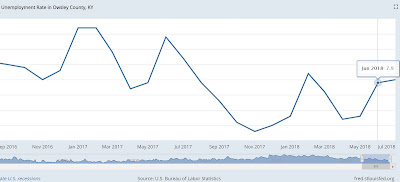Anthony Price had a
problem. Like a number of Owsley County, Kentucky residents, Price travels for
work. “Unless you work for the school system or the state, there’s not a lot of
options,” Price says of economic opportunity in what the U.S. Census Bureau’s
2016 American Community Survey found was the third-poorest county in the United
States. Owsley County’s July 2018 unemployment rate of 8.0 percent was nearly
double the state’s rate.
 |
| The Census Bureau's Opportunity Atlas paints a challenging portrait of Owsley County, Kentucky. |
Traveling for Norfolk
Southern on a large production railroad tie gang is good for Price’s finances.
It hasn’t made accessing financial services in his hometown of Booneville that
easy, though. This isn’t surprising given the lack of opportunity that has long
plagued remote Appalachian areas – a fact summed up in this snapshot by the Census
Bureau’s “Opportunity Atlas” (also shown at right).
“The banks want you to
come in physically and sign papers and wait a week or two for a loan
application,” Price says.
That route is tough on
people who earn their living away. Last year, Price used an online credit
provider for a vehicle loan. He did it despite having good credit and despite
the 23 percent interest rate.
Then Price learned about
Appalachian Community Federal Credit Union
(ACFCU). The mission-driven CDFI credit union placed a “virtual teller machine”
in Booneville in 2017 specifically to help address its vastly underserved
population by using financial technology.
 |
| Lisa Botner is a Booneville native who is working to help develop her home county. |
Price, who was needing a
new work vehicle, messaged former classmate and ACFCU specialist Lisa Botner on Facebook – virtual step one.
ACFCU’s Owsley County
model helps the credit union reach underserved communities where
brick-and-mortar locations might not be justifiable. It frees up resources so people
like Lisa can partner with non-profits, provide financial coaching and help
spur community and economic development.
“One phone call got the
process started, and she had all the paperwork ready for me when I came home,”
Price says. Price also refinanced the high-interest online loan and is saving
hundreds in interest.
Price says he didn’t
know about ACFCU’s mission until Botner filled him in. He’s certainly spreading
the word about this new option for Owsley Countians.
 |
| Unemployment remains stubbornly high in Owsley County. |
“I’ve told everybody,”
he says. “It’s a good thing, especially for the people over there when there’s
limited options.”
ACFCU’s commitment
extends to financial coaching, combined with fair lending products, designed to
help members stair step their way to greater financial health and stability,
regardless of income.
“It’s been hard getting
through to people that there’s something different,” Botner says. “At first
people were confusing us with a payday lender. Getting people to understand we
don’t just hand out money and charge you horribly high interest rates has been
a challenge.”
Botner says she
anticipated those challenges. “But word’s getting out, people are figuring out
what we’re really about and we’re actually starting to earn people’s trust.”




No comments:
Post a Comment